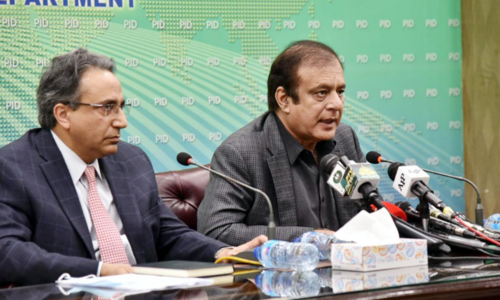IF you’re confused by all the talk around the LNG import issue these days, there is one thing to focus on which helps explain it all. Winter is peak season for gas demand, there are always shortages as everyone knows for many years now, and arrangements for LNG imports for December, January and February have to be made months in advance. Failure to make advance arrangements means higher costs. And that is exactly what has happened here.
The way LNG imports work is a little more complex than oil deliveries. First demand forecasts need to be drawn up by the gas distribution companies, particularly SNGPL, the company that caters to demand in the northern provinces of the country where winter demand is higher due to lower temperatures. These demand forecasts are sent to Pakistan LNG Ltd, a public-sector-owned company that specialises in arranging LNG cargoes for delivery. PLL says it needs at least 90 to 120 days lead time to arrange LNG cargoes in normal months. Once the demand forecasts are received cargoes are booked accordingly.
In 2018, for example, PLL had to write an angry letter detailing how delays in communicating anticipated demand cause problems and increase the expense of LNG imports. “SNGPL, vide letter dated October 25, has conveyed its additional RLNG requirement for the months of December 2018, January 2019 and February 2019. The demand has however been communicated without giving any regard to its procurement lead time. With the onset of winters, the situation is further accentuated,” that letter said in its opening line.
“PLL has time and again requested SNGPL and Power Division to communicate RLNG demand in a timely manner as arrangement of LNG, at competitive prices, requires approximately three to four months … at this late stage, floating a tender for LNG procurement might not attract bidders, owing to high winter demand in the global LNG market or the available cargos pricing will be prohibitive.”
It is estimated that we have lost up to $200m by mismanaging our LNG imports.
A few days later, PLL wrote again to the ministry, asking them to arrange their requirements for the months of January and February from PSO instead since the bids they were getting for those months were higher than what PSO gets for the contract gas they buy. PLL had invited bids for three cargoes in November 2018 for delivery in the months of January and February 2019, which is very late, and their bids were all far above 14 per cent of the price of Brent crude oil to which LNG prices are often indexed.
“Considering the fact that under PSO’s LNG supply agreements, the slope as a percentage of Brent, is 13.37pc, which is significantly lower than the lowest bids received against all the above delivery windows” that letter said.
The single percentage point difference is very large in the world of LNG cargoes. If PSO could arrange these supplies on the terms of its long-term agreement with Qatar Gas (signed by the previous government and attacked regularly by the incumbent government for being too expensive), it would “result in a saving of USD 10 to 12 million to the national exchequer” PLL informed the ministry.
This was the price of delay, and the price increases as the price of Brent crude rises, or the lead time given for procurement of the cargoes is decreased.
Last year, PLL received demand forecasts by April and drew up an LNG Procurement Plan for the full year, except for the months of November and December, for which tendering was scheduled to happen by August. That procurement plan saw 30 cargoes scheduled for delivery for all months up till October, with clear breakdowns given for each month. Bids for the November and December cargoes were invited in August, and 10 cargoes were booked, six for the months of October and November, and four for December.
But this year something went wrong. PLL’s website shows a bid in the month of August for two cargoes to be delivered in September (these are spot cargoes only that are used to meet demand over and above contract gas from long-term supply agreements). They got lucky and the lowest bid was at 10.88pc of Brent (where the contract price is 13.37pc), because due to Covid-related shutdowns the LNG market was in a slump. Industry insiders say this was the time, back in August, to have followed normal practice and place bids for the winter months, as well as look into locking some of these low prices in five-year supply contracts.
Industry insiders say at least three long-term contracts were indeed signed during this time by other parties (outside Pakistan) to lock in the low rates available during the Covid days, all at only slightly above 10pc of Brent, significantly cheaper than anything Pakistan is getting these days.
But that did not happen. Instead, the next tender was floated in September, for November delivery, and the bids received were all far above the long-term contract price, with the lowest ones being 14.23pc and 13.84pc respectively. Some of the bids were beyond 15pc and 16pc, the highest seen in a long time. A week after this they advertised again, for another cargo for November delivery, and the lowest bid was for 13.87pc of Brent, again higher than contract price.
By now, LNG markets were abuzz with talk of Pakistan being a desperate buyer. And then the government tendered for six cargoes for December delivery in the month of October, almost three months late, and the bloodshed began. Bids poured in, but the rates were the highest Pakistan has ever seen, ranging from 16.1pc of Brent to 19.3pc.
Industry people estimate the country has lost up to $200 million by mismanaging its LNG imports for this winter season. And the fact that this has happened when the government has been busy alleging corruption and malfeasance against its predecessors in the long-term supply agreement with Qatar adds an additional twist of irony to the tale.
The writer is a member of staff.
Twitter: @khurramhusain
Published in Dawn, December 3rd, 2020














































